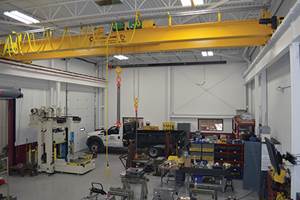Top 10 Best Advice for Competing Globally
Top 10 Best Advice
1. Understand thy competition. There is no greater power in the world than knowledge. Understand that there are good and bad people everywhere. Look for the good and stay away from the bad.
2. Exceed expectations. Go a step or two beyond the written agreement. This creates good will and the customer will not forget it. Be there when questions and problems develop. Address them promptly and accurately and to the customer’s satisfaction. Set yourself apart from the competition. Create a niche and become known for this special service or expertise.
3. Keep an open mind. Be willing to approach the global market with an eye toward how can it help me versus how can it hurt me. Base your opinions and assumptions on facts you know to be true or your personal experiences. Understand that in order to do business globally, you need to be more flexible than you might be in your own shop. The mode of operation in every location needs to be tailored to the cultural and personnel needs of that local.
4. Know your customer. Certainly it is most important to get to know the customer. Meet him/her, visit, talk a lot, try to fully understand needs and wants, and establish a rapport.
5. Prepare. Carefully prep real costs and expected profit—looking at exchange rates, logistics, potential costs of quality [or lack of it], business travel, etc. Only move forward if a profit is clearly large enough. Drop the plan if no profit or too small a profit to consider.
6. Communicate. Set up lines of communication, and have a single point of contact in your own firm. Quickly move on design changes, material changes and quality issues. Your contact should specialize in the language and culture issues relevant to the customer.
7. Take measurements. Measure the things that are important for your business to succeed. What is measured improves.
8. Reduce waste. Focus on reduction of labor and overhead by improved implementation and utilization of people, process and equipment. Stay focused on new technology, advanced techniques and the application of value-added services. Create a culture of efficiency and minimize waste to finite levels. Automate equipment; create work cells.
9. Offer great value. Your products or services may be more expensive, but what you offer is of high value to the customer; they offer the best ratio of price to performance. Don’t compete on price. Be certain that your quoting process is providing consistent quality quotes at the lowest possible cost, with reasonable leadtimes with quick quote turnaround.
10. Team up. Join a trade association. Serve on a board involved in the trade. By going to conventions or meeting other shops at trade events you can create opportunities and reduce your service costs by eliminating some of the travel expenses. Once you meet with other shops you trade plant visits with them to build a relationship. This relationship must have a few key elements: trust for each other’s company, confidence that they have the proper personnel and technical resources for your type of work, and a familiarity with solving problems that would arise at your customers. Most importantly, make sure that everyone on board has a standard of personal integrity and enough ethical fortitude not to take any business from each other. Team up with other local shops in your area to help each other make aggressive delivery dates. Team up with shops across the country that are far from you, but near your customers.
Related Content
The Trifecta of Competitive Toolmaking
Process, technology and people form the foundations of the business philosophy in place at Eifel Mold & Engineering.
Read MoreTop 10 Topics to Cover During an ISO 9001 Manufacturing Audit
Take a look at this practical hands-on approach to conducting a quality audit.
Read MoreDynamic Tool Corporation – Creating the Team to Move Moldmaking Into the Future
For 40+ years, Dynamic Tool Corp. has offered precision tooling, emphasizing education, mentoring and innovation. The company is committed to excellence, integrity, safety and customer service, as well as inspiring growth and quality in manufacturing.
Read MoreEditorial Guidelines: Editorial Advisory Board
The Editorial Advisory Board of MoldMaking Technology is made up of authorities with expertise within their respective business, industry, technology and profession. Their role is to advise on timely issues, trends, advances in the field, offer editorial thought and direction, review and comment on specific articles and generally act as a sounding board and a conscience for the publication.
Read MoreRead Next
How to Use Continuing Education to Remain Competitive in Moldmaking
Continued training helps moldmakers make tooling decisions and properly use the latest cutting tool to efficiently machine high-quality molds.
Read MoreAre You a Moldmaker Considering 3D Printing? Consider the 3D Printing Workshop at NPE2024
Presentations will cover 3D printing for mold tooling, material innovation, product development, bridge production and full-scale, high-volume additive manufacturing.
Read More














